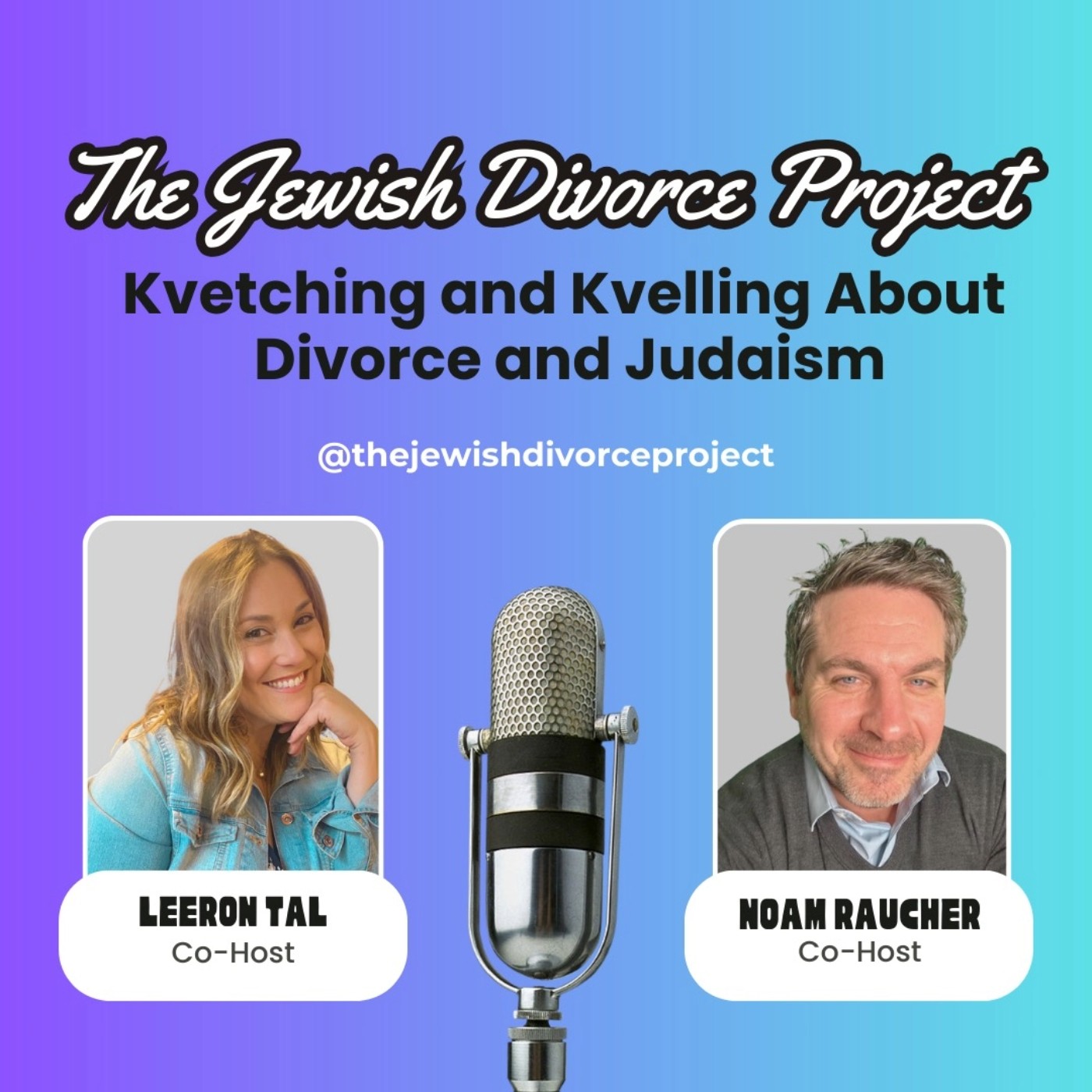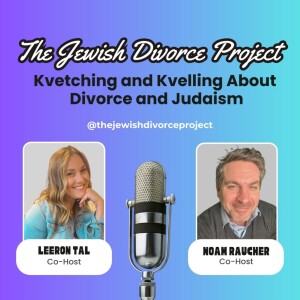
19.8K
Downloads
91
Episodes
Divorce coaches, Jewish professions, and parents with lots of experiences (and plenty of opinions) kvetch and kvell their way through divorce and Judaism :)
Divorce coaches, Jewish professions, and parents with lots of experiences (and plenty of opinions) kvetch and kvell their way through divorce and Judaism :)
Episodes

Wednesday Feb 24, 2021
The Jewish Divorce Project- Ep: 21 - Purim and Boundaries
Wednesday Feb 24, 2021
Wednesday Feb 24, 2021
Hag Sameach! (Happy Holidays!) For episode 21 Noam and Sheva sit down to talk about Purim and setting boundaries. When it comes to setting boundaries in your divorce, are you like King Achashverosh- oblivious to what's going on, or like Esther- conscientious? Or do you find yourself swinging between absolutes like Haman and Mordechai?

Tuesday Feb 16, 2021
The Jewish Divorce Project - Episode 20: Loneliness, Isolation, and Self-Worth
Tuesday Feb 16, 2021
Tuesday Feb 16, 2021
Probably the rawest episode we've done yet. Sheva and Noam talk about loneliness, isolation, and some of the impacts on self-worth. How long do you hold onto to friendships that seem dead? Do you reach out and ask for some love, or do you hope others will see you and reach out? Either way, your worth is not determined by how many people invest in you. Your worth is determined by how much you care to invest in yourself.
Warning: F-bombs in this episode.

Wednesday Feb 10, 2021
The Jewish Divorce Project- Episode 19: Our Happy Divorce with Ben Heldfand
Wednesday Feb 10, 2021
Wednesday Feb 10, 2021
This week we’re going to be joined by Benjamin Heldfand, co-author (Nikki DeBartolo) of Our Happy Divorce. From weeknight dinners and homework sessions with their son to Christmas card photos and vacations, Nikki DeBartolo and Benjamin Heldfond have created a tight-knit, enviable family. They work and play well together, from the smallest daily tasks to the biggest life events-and it only took a divorce to get them there. Though their marriage has been over for nearly a decade, they still share a happy life with each other and their son Asher, along with their new amazing spouses and children. (Google Books)
You can also find the Our Happy Divorce group and radio show on Facebook.

Thursday Feb 04, 2021
The Jewish Divorce Project - Episode 18: Impacts of Divorce on Children
Thursday Feb 04, 2021
Thursday Feb 04, 2021
Chai-Everybody! Episode 18 is out and ready for consumption. This week Noam and Sheva discuss the possible impacts of divorce on children young and old.
If you feel comfortable, share a ritual, or process, you have for custody exchanges. How do you show you kids that your time together meant something and that you’re just dropping them off somewhere randomly?
One thing Noam uses is a calendar so his boys know the custody schedule clearly and can understand the flow of transitions.
Next week we will joined by Ben Heldfand, co-author of Our Happy Divorce!

Wednesday Jan 20, 2021
Wednesday Jan 20, 2021
In time for Inauguration and MLK Day Noam and Sheva sit down to discuss the themes reflected in both those American celebrations: Overcoming differences, reconciliation, accountability, and forgiveness.
“How Divine Is Forgiveness”
Marge Piercy
How divine is forgiveness?
It’s a nice concept
but what’s under the sculptured draperies?
We forgive when we don’t really care
because what was done to us brought unexpected
harvest, as I always try to explain
to the peach trees as I prune them hard;
to the cats when I shove pills against
the Gothic vaults of their mouths
We forgive those who betrayed us
years later because memory has rotted
through like something left out in the weather
battered clean then littered dirty
in the rain, chewed by mice and beetles,
frozen and baked and stripped by the wind
till it is unrecognizable, corpse
or broken machine, something long useless.
We forgive those whom their own machinations
have sufficiently tangled, enshrouded,
the fly who bit us to draw blood and who
hangs now a gutted trophy in a spider’s
airy larder; more exactly, the friend
whose habit of lying has immobilized him
at last like a dog trapped in a cocoon
of fishing line and barbed hooks.
We forgive those we firmly love
because anger hurts, a coal that burns
and smolders still scorching the tissues
inside, blistering wherever it touches
so that finally it is to ease our own pain
that we bury the hot clinkers in a mound
of caring, suffocate the sparks with promises,
drown them in tears, reconciling.
Soft Like We forgive mostly not from strength
but through imperfections, for memory
wears transparent as glass with the pattern
washed off, till we stare past what injured us.
We forgive because we too have done
the same to others easy as a mudslide;
or because anger is a fire that must be fed
and we are too tired to rise and haul a log.
“Soft Like a Reed, Not Hard Like a Cedar”
(Babylonian Talmud- section: Fasting, page: 20ab)
Rabbi Elazar was feeling pompous because he had learned a lot of Torah. In so doing he forgot himself and insulted a stranger by calling him, “ugly.” Having received a rebuke from the stranger and recognizing the pain he cause, Rabbi Elazar humbled himself before the stranger, apologized and begged forgiveness.
The stranger was initially reluctant to accept Rabbi Elazar’s apology. However, he eventually did so on the grounds that Rabbi Elazar change his ways and not act in
the same manner again. In agreement RabbiElazar went to the study hall and taught, “One should always be soft like a reed and not hard, or proud, like a cedar.”

Wednesday Jan 13, 2021
The Jewish Divorce Project- Ep 16: Boundaries and Freedom
Wednesday Jan 13, 2021
Wednesday Jan 13, 2021
In this week's episode, Noam and Sheva discuss the need for and the assistance given by boundaries. When you think about it, even as the Israelites journeyed into the freedom, they still needed boundaries to protect them. Boundaries meant to prevent the type of toxic-relationship Pharaoh was offering them.
Ask yourself what types of boundaries do you need to set up in order to feel free. And how do you maintain those boundaries?

Thursday Jan 07, 2021
The Jewish Divorce Project- Episode 15: Visions For New Relationships
Thursday Jan 07, 2021
Thursday Jan 07, 2021
Sheva and Noam are back at it with season 2!
In honor of a new year and new POTUS, Sheva and Noam talk about lessons they've learned on the dating scene and what they would bring to and want from new relationships in the future.
Point of clarity: Inside Out is a Disney pixar movie about emotions and finding ways to integrate them with each other. In and Out is a romantic comedy from 1997 starring Kevin Kline and Tom Selleck, about a man struggling to accept his own gay identity.

Wednesday Dec 16, 2020
Wednesday Dec 16, 2020
Sometimes the podcast creates itself! We give you our very first interview in this week's episode.
This week, Sheva and Noam sit down with Keshet Starr of ORA. (Full bio and description below)*
Keshet sheds light on the work done to bring justice to people who find themselves chained to a marriage they don't want to be in.
During the conversation we discuss: Connection between gett refusal and divorce; the communities role in preventing gett refusal; what a halachic pre-nup is and how it works; and the connection between gett refusal and healthy relationships and healthy divorce.
Since a Jewish marriage is enhanced by the ketubah- a Jewish legal contract outlining the responsibilities and obligations each partner has to the other- the contract must be made void if the marriage ends. Once the ketubah no longer has power over the relationship, each partner is free to marry again within the Jewish faith.
However, if one partner refuses to annul the ketubah this makes the other partner an agunah, or "chained" to their marriage. That's were ORA comes in. ORA fights for those who are chained to ensure that their partners provide them with the divorce and set them free to live their lives.
We also use words like "Halachicly" which means, "in accordance with Jewish law or practice."
*Keshet Starr, Esq., is the CEO of the Organization for the Resolution of Agunot (ORA), the nonprofit organization addressing the agunah (Jewish divorce refusal) crisis on a case-by-case basis worldwide. At ORA, Keshet oversees advocacy and early intervention initiatives designed to assist individuals seeking a Jewish divorce, along with prevention initiatives to eliminate abuse from the Jewish divorce process. Keshet has written for outlets such as the Times of Israel, The Forward and Haaretz, and frequently presents on issues related to Jewish divorce, domestic abuse, and the intersection between civil and religious divorce processes. Keshet has also authored academic work focused on get refusal and domestic abuse, and is a Wexner Field Fellow. A graduate of the University of Michigan and the University of Pennsylvania Law School, Keshet lives in central New Jersey with her husband and three young children.
Organization for the Resolution of Agunot (ORA), the nonprofit organization addressing the agunah (Jewish divorce refusal) crisis on a case-by-case basis worldwide. At ORA, Keshet oversees advocacy and early intervention initiatives designed to assist individuals seeking a Jewish divorce, along with prevention initiatives to eliminate abuse from the Jewish divorce process.

Thursday Dec 10, 2020
Thursday Dec 10, 2020
And we thought we hit our stride with episode 12! But here in episode 13, in honor of Hanukkah, we have lots of point of lights to share.
To begin with, we think we fixed our microphone problem!! Thank you for your patience :) And with those improvements, we discuss the challenges we face with providing worthwhile holiday experiences for kids. And since it's Hanukkah we offer 5 really good tips for resiliency in divorce. Which leads to a great conversation about how music can impact our experiences in breaking up and bouncing back. We conclude with a conversation about proper hanukkah delicacies. Check out our facebook and Instagram pages for our tips for resilience and musical playlist recommendations.
Sheva and Noam’s Tips For Resiliency in Divorce
- Investigate your perspective on failure. Did you fail? What went wrong and how can you use it to launch from there?
- Cultivate a sense of hope. Don’t dwell in the experience, and ask what moment of hope can you focus on instead.
- Adjust your boundaries as necessary. Which ones do you need to tighten and which can you loosen?
- At least 1 ally- You will need at least 1 person in your corner beside your lawyer.
- Get Moving! Music and Exercise can help remind you how capably you are and how you can get past challenges. This may also help interrupt unhealthy mental feedback loops and cognitive distortions we face.

Friday Dec 04, 2020
Friday Dec 04, 2020
This week’s episode is theologically and psychologically deep. And there is plenty of good spiritual wisdom to take from divorce that applies to our lives during COVID.
In this episode, Noam and Sheva take a look at the tension between the way we think our marriages are supposed to turn out and the way we see them actually turning out. How responsible are you for creating that circumstance? Is there a plan that we’re supposed to find and follow? What is there to learn about myself from this life-changing event?
Vayishlach refers to the name of the Torah portion that Jews will study this Saturday. It means, “And he sent.” Which refers to the patriarch, Jacob, sending all his possessions and family away before he had a life-changing encounter. This experience is described as a wrestling matching between Jacob and mysterious stranger. Some speculate this could be God, or an angel of God. Others offer that Jacob experienced an inner-struggle as he was reconciling who he truly was the night before seeing his estrange brother, Esau, for the first time since deceiving him.
Suffering in itself does not heal. Only suffering that has meaning and is accepted willingly has the power to heal and to transform an individual into a whole person…. Jung named this process of growth from one stage of awareness to another individuation. Transformation, or real change of character, can take place in a person only when, through suffering, he engages in an active struggle with the Shadow, the dark side of himself. (Esther Spitzer, “A Jungian Midrash on Jacob’s Dream,” The Reconstructionist, October 1976, pp. 22-23)
